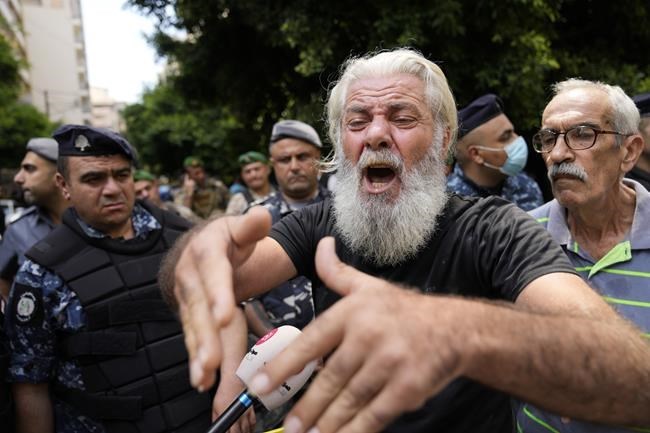BEIRUT (AP) — A hostage standoff in which a gunman demanded a Beirut bank let him withdraw his trapped savings so that he could pay his father's medical bills ended seven hours later with the man's surrender Thursday. No injuries were reported.
Authorities said Bassam al-Sheikh Hussein, a 42-year-old food-delivery driver, entered the bank with a shotgun and a canister of gasoline, fired three warning shots and locked himself in with up to 10 hostages, threatening to set himself on fire unless he was allowed to take out his money.
After hours of negotiations, he accepted an offer from the bank to receive part of his savings, according to local media and a depositors group that took part in the talks. He then released his hostages, and police whisked him away as he walked out of the bank.
He did not actually receive any of the money, according to a lawyer who provided legal support to Hussein and his family.
His wife, Mariam Chehadi, who was standing outside, told reporters after his arrest that her husband “did what he had to do."
The hostage drama in the city's bustling Hamra district was the latest painful episode in Lebanon’s economic free-fall, now in its third year. The country's cash-strapped banks since 2019 have slapped strict limits on withdrawals of foreign currency assets, tying up the savings of millions of people.
Hussein had $210,000 trapped in the bank and been struggling to withdraw his money to pay his father’s medical bills, said Hassan Moghnieh, who as head of the advocacy group Association of Depositors in Lebanon took part in the negotiations.
Hussein’s brother Atef, standing outside the bank, told The Associated Press during the standoff that his brother would be willing to turn himself in if the bank gave him money to help with the bills and other family expenses.
“My brother is not a scoundrel. He is a decent man,” Atef al-Sheikh Hussein said. “He takes what he has from his own pocket to give to others.”
Lebanese soldiers, officers from the country’s Internal Security Forces and intelligence agents converged on the area during the standoff. Seven or eight bank employees were taken hostage along with two customers, George al-Haj, head of the Bank Employees Syndicate, told local media.
Dozens of protesters gathered, chanting slogans against the Lebanese government and banks, hoping that the gunman would receive his savings. Some bystanders hailed him as a hero.
Lebanon is suffering from the worst economic crisis in its modern history. Three-quarters of the population has plunged into poverty, and the Lebanese pound has declined in value by more than 90% against the U.S. dollar.
“What led us to this situation is the state's failure to resolve this economic crisis and the banks' and Central Bank's actions, where people can only retrieve some of their own money as if it's a weekly allowance,” said Dina Abou Zor, a lawyer with the advocacy group Depositors' Union who was among the protesters. “And this has led to people taking matters into their own hands.”
In January, a coffee shop owner withdrew $50,000 trapped in a bank in Lebanon after taking employees hostage and threatening to kill them.
Kareem Chehayeb And Fay Abuelgasim, The Associated Press

